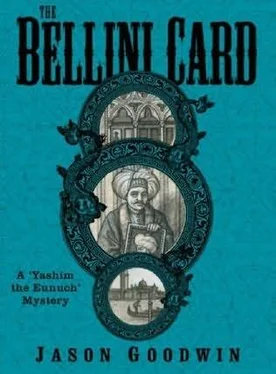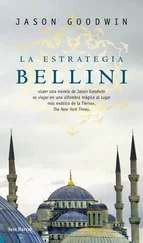Jason Goodwin - The Bellini card
Здесь есть возможность читать онлайн «Jason Goodwin - The Bellini card» весь текст электронной книги совершенно бесплатно (целиком полную версию без сокращений). В некоторых случаях можно слушать аудио, скачать через торрент в формате fb2 и присутствует краткое содержание. Жанр: Исторический детектив, на английском языке. Описание произведения, (предисловие) а так же отзывы посетителей доступны на портале библиотеки ЛибКат.
- Название:The Bellini card
- Автор:
- Жанр:
- Год:неизвестен
- ISBN:нет данных
- Рейтинг книги:5 / 5. Голосов: 1
-
Избранное:Добавить в избранное
- Отзывы:
-
Ваша оценка:
- 100
- 1
- 2
- 3
- 4
- 5
The Bellini card: краткое содержание, описание и аннотация
Предлагаем к чтению аннотацию, описание, краткое содержание или предисловие (зависит от того, что написал сам автор книги «The Bellini card»). Если вы не нашли необходимую информацию о книге — напишите в комментариях, мы постараемся отыскать её.
The Bellini card — читать онлайн бесплатно полную книгу (весь текст) целиком
Ниже представлен текст книги, разбитый по страницам. Система сохранения места последней прочитанной страницы, позволяет с удобством читать онлайн бесплатно книгу «The Bellini card», без необходимости каждый раз заново искать на чём Вы остановились. Поставьте закладку, и сможете в любой момент перейти на страницу, на которой закончили чтение.
Интервал:
Закладка:
“Shoots himself, if he’s a gentleman,” Palewski said. “Unless he can pay, of course.”
“He can pay-but he wouldn’t have the money on him. What then?”
“Then, if he’s trusted enough, he’ll give his creditor a note of hand.”
“A note of hand? A promise to pay later, you mean?”
“Depending how often they cash up, the whole game can be notes of hand. I lose, I write you one. You stake it next time. Lots of paper, back and forth. I gave it up, years ago. Too many fellows gamble and drink at the same time. Awfully dangerous, gambling.”
“Signed paper?”
“Signed, of course. Next day, when he’s feeling like Marat in his bath, the unlucky gambler gets presented with all his notes for immediate payment.”
“I suppose, in some cases, the signature might be worth more than the note.”
“Threaten to show it to the wife, sort of thing? Happens. Depends on the company you chose.”
“Or on who you are,” Yashim murmured.
“You’re being mysterious, Yashim.”
Yashim nodded slowly. “It is still a mystery, my friend.”
92
The contessa received Yashim in the salon where, only that morning, she had tried to kill him. Yashim wasn’t sure when she had looked more beautiful: now, in the shadowy salon, or before, with murder in her eyes. Her dress was beaded with seed pearls that shimmered mysteriously as she moved, and her hair was pinned up, revealing her slender neck.
Candles were lit on a table laid for two.
“I have thought about you all day,” she said simply. “Wondering what you know.”
Yashim bowed his head. “I know too little, Contessa.”
“So.” Her eyes sparkled. “What do you know of the pattern-our pattern?”
Yashim frowned. “I’ve been wondering about that myself. Today, I would have said that it is a system-the key, if you like-to a discipline of combat. Both of us used it.”
“And is that all?”
“It might be-except that I have seen it elsewhere, without really seeing it at all. Yamaluk the calligrapher used it, on the binding of the Koran your people gave to the Armenian monastery. His daughter told me that it was a symbol of the infinite richness of God’s creation.”
“Very good. That’s one meaning-the essential one, I suppose.” Carla traced the line of the diagram with her foot. “Did you speak to Yamaluk efendi, in Istanbul?”
“I spoke to his daughter. Yamaluk efendi has-passed away.”
“I am sorry to hear it. My father always loved his work.”
“His daughter continues the tradition,” Yashim said.
She looked at him again: he felt raked by those eyes.
Then she laughed quietly. “Istanbul has changed, Yashim Pasha.”
He acknowledged it with a gesture. “But you, Contessa, cannot know Istanbul.”
“I was born there,” she retorted. “I lived there until I was three years old. Istanbul is in my blood. But Venice has changed, too.” She took a breath. “This morning you mentioned Bellini.”
Yashim started. “Yes.”
Carla sighed. “Gentile Bellini went to Istanbul in 1479, at the sultan’s invitation.”
“To paint the sultan’s portrait.”
“The portrait was an afterthought,” the contessa said, shaking her head. “The sultan commissioned it only after he’d seen what Bellini could do.”
“But if Bellini wasn’t sent to paint the sultan’s portrait, why did he go?”
The contessa gestured to the table and took a seat.
“One of my Aspi ancestors took Bellini to Istanbul, as an unofficial ambassador. Mehmet considered himself to be a universal ruler. As the conqueror of Istanbul, he became the most powerful ruler in the Byzantine world, a world that informally included Venice.” She touched her glass. “The diagram was a symbol of sovereignty that Mehmet wanted to understand. The Byzantines had woven it into their church ritual. To them it represented the union of the finite and the infinite. The worlds of God and men. For us, it also symbolized the endless round of commerce-a reminder, if you like, that everyone could share in the infinite bounty of the world. Mehmet, I suspect, saw it as a symbol of dominion: one world, one ruler, under God.”
“But why Bellini? Why couldn’t your ancestor have explained the diagram?”
“It’s a good question. I think Gentile knew the city. He and his family had almost certainly been there under the Byzantines. The father, Jacopo, did portraits of the imperial family before the fall of Constantinople.”
She raised her chin. “He wasn’t political, Yashim. Not a warrior. Not a diplomat. Not a merchant, either. He simply had a gift. A near-magical ability to freeze the moving finger-time.”
“Freeze it? How?”
“In paint. In pencil. He understood pattern-but he also helped to pioneer the art of portraiture. He was an adept in both worlds-the world of pattern and geometry, which is eternal, and in seeing the eternal in the things that change and are subject to time.”
“I see.”
“After Gentile painted Mehmet’s portrait, the idea caught on-in Venice, rather than Istanbul.” She lifted the glass to her lips. “But the pattern kept its meaning. A mutual inheritance from the Byzantines. An esoteric bond between our two cities.”
Yashim frowned. “The sultan entered a secret compact? Through Gentile Bellini?”
Carla smiled. “Nothing so sinister, Yashim. It was simply a pattern, an interpretation, we could share. A point of contact between our two worlds.”
Yashim leaned back. “And perhaps an effort to describe them, too? The links are made at various points around the square.”
Carla looked very radiant in the candlelight. Her hair, pinned back, glowed against the gloom of the great dark room. Her eyes sparkled, lit by her slow smile.
“The pupil has excelled the teacher.”
“But if it was essentially a symbol of peace-” Yashim hesitated.
She nodded slowly. “The pattern reconciles, Yashim. It’s true. In an immutable square, those fixed and opposing points are linked and reconciled in an endless weave. Com’era, dov’era. East with West, Venice with Istanbul, death and life, man and woman.” She gazed at him, her eyes bright. “But then came Cyprus.”
Yashim remembered. It was a long time ago: in 1570, Ottoman troops had swarmed across the richest jewel in the diadem of islands that linked the Venetian empire through the eastern Mediterranean. A year later the Venetian fleet, backed by Spain, had destroyed the Ottoman navy at Lepanto.
“Cyprus-and the battle of Lepanto-changed the meaning of the symbol. It came to stand for dominion and war. After that, I suppose, both sides developed a style of combat based on the Sand-Reckoner’s diagram.”
Their eyes met.
“Joseph Nasi helped Sultan Selim to finance the attack on Cyprus,” Yashim said. “In return, he was made Duke of Naxos.”
“Go on.”
“So when Abdulmecid chose the name for his disguise, he was sending some sort of signal. A hostile one.”
Carla shrugged, and the shadows slid across the hollows of her shoulders. “Close. I think-not altogether hostile. Only realistic. Venice is an occupied state for now, and so our relationship with Istanbul cannot be com’era, dov’era.” She gave a small, secret smile. “But your new sultan has a romantic streak, too. And a certain-curiosity. That’s why he came.”
She touched a finger carelessly to her lips, and Yashim knew immediately what the contessa did not say.
“And the Bellini? The portrait of the Conqueror?”
Carla laughed softly.
“It was something sentimental. A link-the last link-between the Aspis and the throne of Osman.”
“You didn’t think-it might be something dangerous to possess?”
Читать дальшеИнтервал:
Закладка:
Похожие книги на «The Bellini card»
Представляем Вашему вниманию похожие книги на «The Bellini card» списком для выбора. Мы отобрали схожую по названию и смыслу литературу в надежде предоставить читателям больше вариантов отыскать новые, интересные, ещё непрочитанные произведения.
Обсуждение, отзывы о книге «The Bellini card» и просто собственные мнения читателей. Оставьте ваши комментарии, напишите, что Вы думаете о произведении, его смысле или главных героях. Укажите что конкретно понравилось, а что нет, и почему Вы так считаете.












